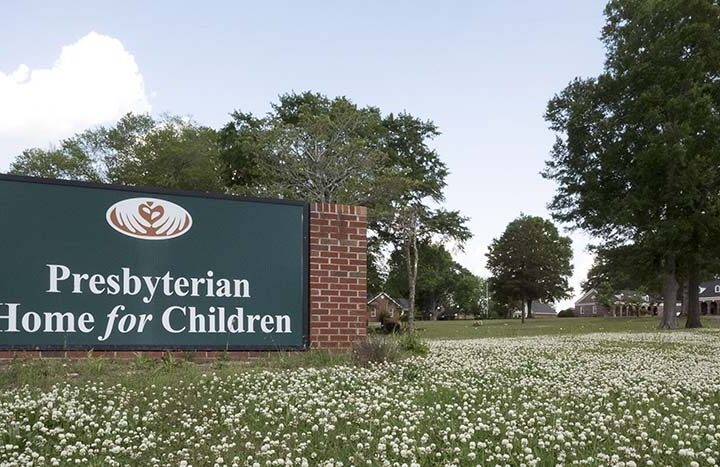8/12/2025
Presbyterian Home for Children in Alabama offers a hand to youth from near and far
by Nancy Crowe

The Presbyterian Home for Children in Talladega, Alabama, is a residential facility for children and families who need extra care and support as they navigate challenging situations.
But in 2020, as the COVID pandemic made life much more challenging for poor families, the Home began to extend services to impoverished areas of Alabama that need support. This includes an in-school program to address hunger, hygiene, and class parties and camp for elementary school kids, as well as a new program to support immigrant children who have entered the US without a parent or guardian.
Both programs have allowed Presbyterian Home to extend services to many more children and families, sharing love in new ways.
Outreach to children in schools
The Home began its mission outreach in Wilcox County, in what’s referred to as the Black Belt of Alabama, during the COVID-19 pandemic, partnering with Thomasville nonprofit M.I.N.D. (Mentoring in New Dimensions). About 30 percent of the county’s 10,000 residents live below the poverty line.
The Alabama River separates the northern portion of the county from the largest city, Camden, which limits residents’ access to services, said Cindy Fisher, the Home’s Director of Communication and Mission Outreach.
New this year is a weekend backpack program for kids in kindergarten through sixth grade at F.S. Ervin Elementary School in Pine Hill.
“A lot of them, when they go home on Friday, don’t have a pantry full of food. So we send enough food for the weekend home with the 40 most needy at the school.”
Fisher modeled the program after one at another Alabama church. “First Presbyterian of Huntsville does this for 40 kids. That’s why I did 40,” she said.
Having no local retailer with the quantities needed, the mission partners order food from Amazon: shelf stable milks, canned pasta, Vienna sausages, cereal, granola bars, juice boxes and the like. It’s all packed up and distributed every Friday.
“More kids want to participate, but we just don’t have the manpower,” Fisher said. “But we find it really helps ensure the kids are well fed and know someone cares.”
A Caring Closet at the school, stocked with clothing and hygiene items, is planned for the 2025-2026 school year. “This closet will supplement the school secretary’s current closet that has a few used clothing items and socks and underwear paid for by the teachers,” she said.
Adding items such as toothbrushes, hairbrushes and peanut butter crackers (for those coming to school hungry) will help meet students’ immediate needs so they can learn and do their best.
Celebrations are important, too. The mission partners’ Christmas and Valentine’s Day parties in Pine Hill include food — very often, expertly cooked soul food — along with hugs and gifts for the kids.
“Their favorite items were coloring books and crayons, teddy bears and neon Slinkies,” Fisher said.
The Home and M.I.N.D. have sent children to overnight camp at Living River Camp in Montevallo, Alabama. Many had never ventured out of Wilcox County, and now they were able to meet kids from elsewhere in the state.
Fisher, who lives in nearby Marengo County, said she’s watched these kids grow up. She’s joined them for celebrations and on a memorable summer camp canoe outing.
“We got stuck in a thunderstorm,” she said. “Here’s a group of kids that have never been in a canoe before, ever, and it was pouring down rain on us. We did pretty good … and then we had something fun to laugh about, because we survived!”
Others in the Home’s network of presbyteries and congregations have expressed interest in helping with the outreach, Fisher said.
“It’s a great opportunity to get Presbyterians working together.”
Seeking shelter in a new land
Being part of a web of helpers for children, no matter where they come from, is key to one of the Home’s newer programs, Caminos®. It’s a nationally coordinated effort to protect and guide young people who have entered the United States without a parent or guardian.
The Home came on board through a sub-recipient grant program with the federal Office of Refugee Resettlement (ORR) and under the oversight of Everstand, a youth-focused nonprofit based in Baltimore, Maryland.
“These children often come from regions experiencing extreme poverty, violence and threats to their safety,” said Doug Marshall, the Home’s President and CEO.
Although the youth are initially housed in federal shelters, the goal of this program is to ensure that these vulnerable young people are safely reunified with family members living in our communities.
“Our workers go to these sponsor families and do Home Studies to ensure these homes are appropriate under ORR guidelines. If so, we send the green light back to the shelter to release them,” Marshall said. Post Release Services (PRS) are then offered voluntarily to help the kids adjust to their new family and community and also connect them to medical, legal and other important services.
Protecting the children from abuse, exploitation and human trafficking is essential, he added. A child with an intellectual or physical disability, or who has already been victimized, is at even higher risk.
Marco Wissner, Lead Case Manager for the program, and three case managers, Tali Dominguez, Michelle Borjas and Cynthia White, travel across Alabama and across the country to assess sponsor homes. They’re also able to provide PRS across Alabama and parts of Tennessee. Wissner and his team are supported in the office by Estefania Medina, Quality Improvement and Administrative Assistant.
“I love being in the field,” Wissner said. “We’re able to provide resources the local state systems can’t always offer, like school enrollment, medical care or trauma-informed support. These are things that help both the child and their sponsor family build a life together.”
It’s a natural extension of the Home’s 157-year mission, Marshall said: offering hope, healing and stability to those who need it most.
